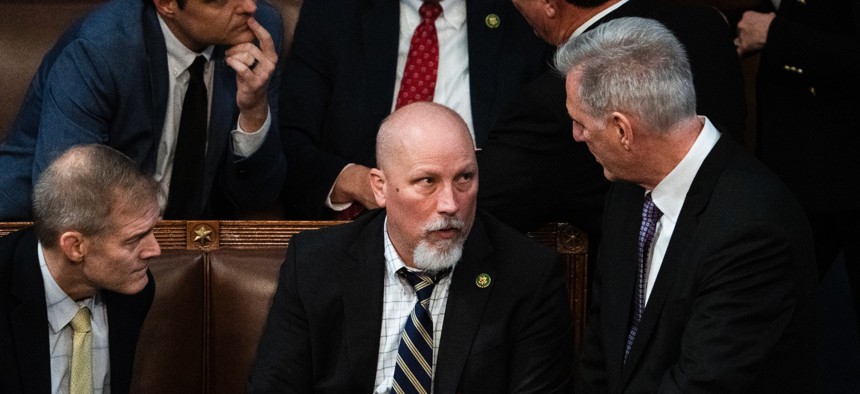Policy
House GOP proposes to punt shutdown for 1 month while slashing agency spending
Stopgap funding measure raises immediate doubts of whether it can pass the House or meaningfully reduce odds of an appropriations lapse in less than two weeks.

Rep. Chip Roy, R-Texas (center), helped draft a stopgap spending bill to fund the federal government through Oct. 31, but it will likely face resistance from Democrats and Republicans. Photo by Tom Williams/CQ-Roll Call Inc. via Getty Images
House Republicans this week are planning to vote on a one-month stopgap bill that would reduce spending at non-defense, non-Veterans Affairs agencies by around 8%, launching a partisan measure that is not likely to find success in the Democratic-controlled Senate.
Lawmakers have less than two weeks to avoid a shutdown when current funding expires Sept. 30 and all sides agree a short-term bill is necessary to buy more time to write full-year appropriations measures. House Republicans on Sunday evening released their plan to extend funding through Oct. 31, though the cuts and other policy riders—including several aimed at restricting the Biden administration from carrying out its immigration policies—would make the measure unpalatable to Democrats and ultimately do little to assuage shutdown fears.
The House Rules Committee is set to send the measure to the floor on Monday, where the chamber is expected to vote later this week. Its success there is not guaranteed, with several conservative lawmakers already taking to X, the platform formerly known as Twitter, to denounce the proposal. With Democrats likely to unite in opposition to the continuing resolution, House Speaker Kevin McCarty, R-Calif., can only afford to lose fewer than a half-dozen votes.
In addition to the immigration provisions, the CR would allow the departments of Agriculture and Interior to repurpose money from the 2021 infrastructure law to ensure federal firefighters do not see their pay slashed in October. The White House has instead requested additional funds to avoid the pay cliff, but Republicans did not include that in their bill. They similarly rejected President Biden’s request for additional, emergency funding for Ukraine aid and the Federal Emergency Management Agency’s Disaster Relief Fund. The bill would allow FEMA to access its full-year allotment during the CR period.
If the House is able to pass its stopgap measure, it would potentially allow the Senate to amend the language to strip out the cuts and other controversial provisions and send it back to the House. Whether McCarthy would allow such a bill to come up for a vote—which would require significant Democratic support for passage, as many in his own caucus have vowed to reject any such measure—remains unclear.
Rep. Chip Roy, R-Texas, a conservative lawmaker who helped draft the month-long CR proposal, predicted a shutdown would occur after the Senate rejects the bill. McCarthy, however, has implored his caucus to support some form of a stopgap bill, saying it would create more time for the House to pass its full-year appropriations bills and earn more leverage in future negotiations over fiscal 2024 spending levels.
House Republicans are looking to slash spending at non-defense agencies far below the levels they agreed to earlier this year as part of a deal to lift the debt ceiling. The House has so far passed just its VA spending bill. It has teed up measures to fund the departments of Agriculture, Defense, State and Homeland Security, though it has delayed those votes due to insufficient support within its own caucus. Republicans now plan to vote on at least the defense bill, in addition to the CR, this week.
Democrats beseeched Republicans to recognize the urgency they now face.
“House Republicans want to shut down the government because House Democrats, Senate Republicans and Democrats, and President Biden oppose their extreme cuts that will make working families pay even more for the things they need at a time when the cost of living is already too high,” said Rep. Rosa DeLauro, D-Conn., the top Democrat on the House Appropriations Committee. “As I said last week when they had to pull the Defense bill from floor consideration, it is time to end the charade and to get to work.”
The Senate, meanwhile, has passed all 12 of its annual funding bills through its Appropriations Committee, with each of the measures conforming to the budget caps established by Fiscal Responsibility Act. In a 91-7 procedural vote, the chamber easily moved forward on its first package of three of those bills last week. Final passage was delayed, however, when Sen. Ron Johnson, R-Wis., objected to a subsequent procedural step that required unanimous approval. Senators in both parties condemned the obstruction, noting the delicate bipartisan work that had taken place over the previous several months to reach an agreement.
While Senate Majority Leader Chuck Schumer, D-N.Y., has said he and McCarthy previously agreed to pursue a short-term spending bill, the speaker is now facing pressure from various factions within his caucus. Some conservative lawmakers have threatened to put forward a motion to strip McCarthy of his speakership if he does not comply with their demands to cut spending and disrupt Biden’s agenda.
Funding agencies at the levels under the Fiscal Responsibility Act would usher in a renewed era of belt-tightening across government. The House Republicans bills would force drastic, across-the-board cuts.
Office of Management and Budget Director Shalanda Young said in a memorandum last week that McCarthy has broken his promise and is instead pushing to "gut key investments in the American people."
"A deal is a deal," Young said. "The president and the Speaker already made a bipartisan budget agreement—one that would result in $1 trillion of deficit reduction over the next decade,” Young said. “Every party to that agreement except House Republicans—House Democrats, Senate Democrats, Senate Republicans and President Biden—are honoring their word.”
If Congress has not passed line-by-line appropriations for each agency by Jan. 1, an automatic, across-the-board 1% cut from current levels will take effect.
This story was first published on Government Executive.
NEXT STORY: Legislation seeks to prevent abortion charges against mothers in Florida
